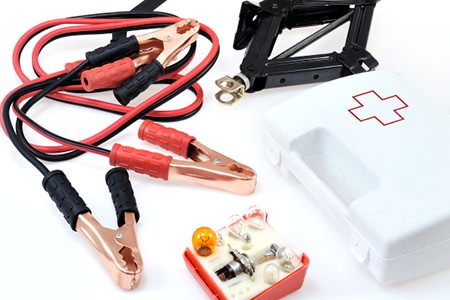Safe Driving: Emergency Items to Keep in the Trunk

Whether you're a man or a woman, young or old, commuter or occasional driver, there are certain things that you should keep in your car at all times. You won't use these items every time you drive, but you'll be glad that they're on hand when you have a problem.
None of these things are very expensive. Most don't take up much space in your car. There's no excuse to avoid buying these items and keeping them in easy-to-reach places on every trip.
- Fire extinguisher. Make sure that the one you select is rated to handle all types of fires, especially electrical. You should check the extinguisher on a regular basis to make sure that it's still charged and ready to use.
- Complete tire-changing setup. You'll need a lug wrench, a jack and spare tire. You should also keep a chock on hand. Even if you just use a block of wood, you'll need something to keep your car from rolling if you're forced to change a tire on an incline.
Tip: Check the air pressure in your spare tire when you check out the other four tires. Many people have flats that can’t be changed because their spare tires slowly lost air over the months and years.
- Road flares or reflective triangles. If you break down on a curve or other dangerous spot, you need to warn other drivers before they plow into your car.
- Flashlights are handy even during daylight hours. You never know when you’ll need to check something under the hood - where the sun doesn’t necessarily reach. If you're concerned about breaking down in the rain, invest in a waterproof flashlight or battery-powered torch. You should also make sure that you keep fresh batteries on hand at all times: you want the beam to be as bright as possible.
- Empty gas can. You should never store full gas cans in your car. Instead, keep a brand-new can in the trunk. Even a one-gallon can helps you get enough fuel to reach the next gas station.
- Basic first-aid kit. You should have bandages, tweezers, over-the-counter painkillers and antibiotic ointments. You can also include gauze and heat packs. Remember to update this kit as medicines and other items expire.
- If you live in an area that sees snow, you should keep a compact shovel in your trunk. This will help you dig out if you're stuck. You can find camping-style shovels at most sporting-goods stores.
- Some people have a jump-starting kit in their trunks. This standalone device jumps a dead battery without the need of another car. This is a more expensive investment than the other items on the list. However, many people find this safer and faster than waiting for a stranger to stop and offer help.
- A cell phone. Even if you don't need to call your auto club for help, you'll still feel better knowing that you have a way to get in touch with people you know.
Many cell-phone services offer emergency-only phones. You can’t call anybody you want, but you can always reach emergency contact numbers if you need them. If you can't afford a regular contract, or just don't like cell phones, this is a great option: one that keeps you safe without draining your wallet or creating a constant nuisance on your belt or in your purse.
 Whether you're a man or a woman, young or old, commuter or occasional driver, there are certain things that you should keep in your car at all times. You won't use these items every time you drive, but you'll be glad that they're on hand when you have a problem.
Whether you're a man or a woman, young or old, commuter or occasional driver, there are certain things that you should keep in your car at all times. You won't use these items every time you drive, but you'll be glad that they're on hand when you have a problem.